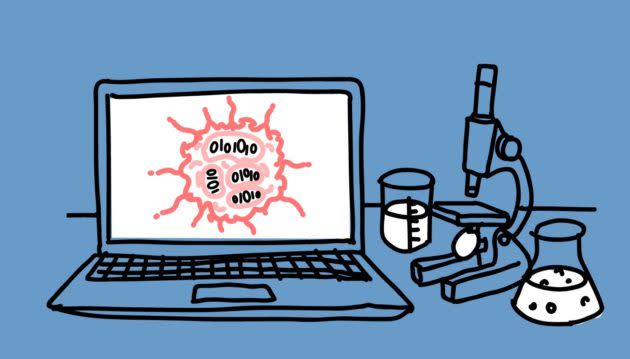Microsoft’s cancer moonshot: Debug the disease as if it’s a computer glitch

Microsoft researchers are doing a bug bash on cancer, complete with software code names like “Project Hanover.”
Some of them are actually drilling down into our genetic code, looking for ways to reprogram the immune system to combat cancer cells more effectively.
“If you can do computing with biological systems, then you can transfer what we’ve learned in traditional computing into medical or biotechnology applications,” Microsoft’s Neil Dalchau says in the company’s in-depth report about its cancer moonshots.
Others are enlisting the power of cloud computing to identify which treatment would work best for a particular cancer patient, based on his or her personalized medical profile. Microsoft and AstraZeneca are already using a software tool known as the Bio Model Analyzer to figure out why leukemia patients respond differently to different treatments.
“I’m not saying that cancer will cease to exist,” says Jasmin Fisher, a senior researcher in Microsoft’s research lab in Cambridge, England. “But once you manage it – once you know how to control it – it’s a solved problem.”
At Microsoft Research’s lab in Redmond, Wash., Project Hanover takes advantage of machine learning and Microsoft’s Azure cloud computing platform to connect clinical cases with cancer research.
“If we can use this knowledge base to present the research results most relevant for each specific patient, then a regular oncologist can take a look and make the best decision,” says Ravi Pandya, a principal software architect at Microsoft who’s working on Project Hanover.
Yet another project pairs machine learning with computer vision to analyze thousands of images from a CT scan and tell radiologists exactly how much a tumor has changed since the last scan.
The data projects in Cambridge and in Redmond are part of a much wider push to apply advanced software tools to the war on cancer. That push is being pioneered not only by Microsoft, but also by IBM and the National Cancer Institute. One of the pilot projects backed by NCI is based at Seattle’s Institute for Systems Biology.
The medical applications of cloud computing and artificial intelligence may well help “solve” cancer someday, but there’s another benefit to data-driven cancer moonshots: Jeannette Wing, corporate vice president of Microsoft Research, says figuring out the machinery of the cell and the genome could set the stage for a future revolution in computing.
“If the computers of the future are not going to be made just in silicon, but might be made in living matter, it behooves us to make sure we understand what it means to program on those computers,” she says.
Check out the full report from Microsoft Stories.
